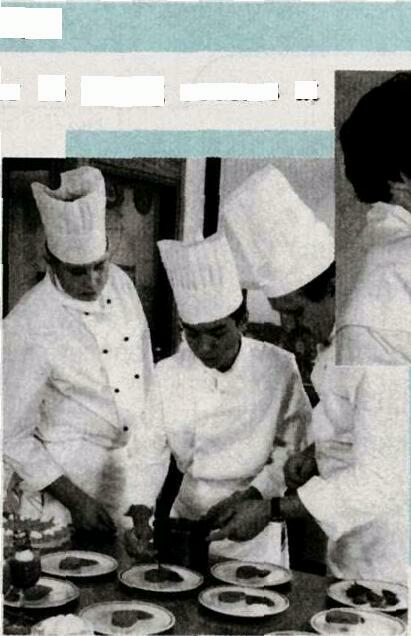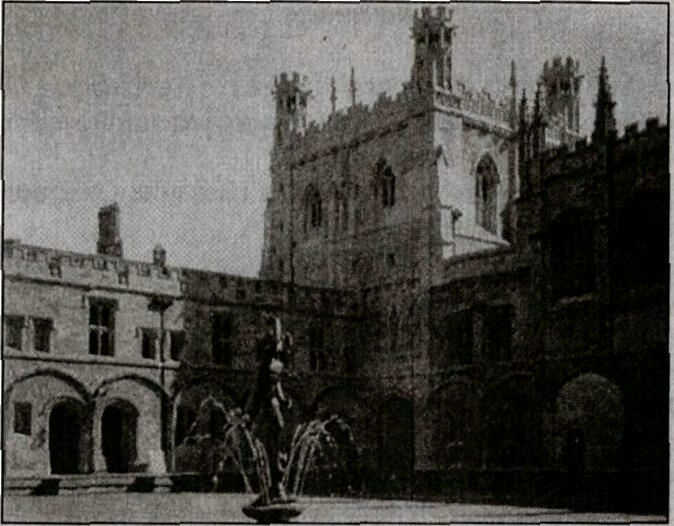
- •Передмова
- •Unit I ukraine, our home
- •How much do you know?
- •Ukraine
- •The national emblems of Ukraine The national emblems include the coat of arms, the flag, and the seal.
- •The ukrainian language
- •The system of schooling
- •It is never too late to learn.
- •Comprehension
- •Decide whether these statements are true (t) or false (f)
- •Unit II ukrainian way of life
- •How much do you know?
- •Traditional food
- •Sport life
- •Welcome to ukraine!
- •Ecology
- •Comprehension
- •Do you know that …
- •Unit III
- •What image of Britain do you have?
- •Great britain
- •Home, sweet home
- •British food
- •Comprehension
- •Decide whether these statements are true (t) or false (f)
- •Discussion points
- •Unit IV british world
- •Sports and games
- •E ducation What are the colleges and institutes of higher education?
- •Holidays in great britain
- •References
- •Comprehension
- •Discussion points
- •How much do you know?
- •The united states of america
- •Washington, d.C.
- •The transatlantic connection
- •Education in the usa
- •Universities and colleges
- •Comprehension
- •Discussion points
- •I. The names of some states have been scrambled up. Find the names of the states, and then write a sentence about an important industry or product of that state.
- •I9% Hispanic (also I. Look at the chart and complete the sentences.
- •III. Choose the right variant to complete the following sentences.
- •IV. Match the words in the column a with their equivalents given in the
- •2) Look at the list of values. Try to guess which value is linked to each saying.
- •The lifestyle of americans
- •Sweet home
- •Eating american style As American as apple pie
- •What’s for breakfast?
- •Fast food
- •Sports crazy
- •Time out
- •Going on vacation
- •Public holidays
- •Comprehension
- •Test yourself at home
- •I. Choose the right variant to fill the gaps in these sentences.
- •Which is better for you?
- •I II. 1) You need equipment to play most sports. Look at the list of sports and decide what equipment is needed for each sport.
- •2) There's something else that you need to play all of these sports. What is it?
- •3) What kind of sports do you play? What special equipment do you need? television in modern life
- •IV. What type of tv program are you probably watching if you see the following? Match the description on the left with the programs on the right.
- •On vacation
- •National public holidays
- •Literature
E ducation What are the colleges and institutes of higher education?
Most people could name a university. But how many could name a college or institute of higher education, or appreciate their role in the higher education sector alongside the universities? Too often there is confusion between colleges of Higher Education and colleges of Further Education.
Briefly, there are 55 HE colleges and institutes throughout England and Wales. They give degrees, diplomas, certificates and postgraduate awards which are welcomed by employers nationally and internationally. They range from specialist colleges (many of which are leaders in their field) to large, multi-campus establishments. They are particularly known for teacher training, the links with local business and the community, and the vocational content, quality and professionalism of the courses.
Being smaller in size than universities, HE colleges and institutes also have the advantage of greater flexibility. The range of courses and subject combinations is very broad; traditional single-subject courses are offered, together with a vast range of technical, professional and postgraduate qualifications.
THE OPEN UNIVERSITY
The Open University (OU) offers degrees for people who do not have a formal education and qualifications, or who are older and do not want to enroll at a university or college. Students study and write essays at home and then post them off to a tutor for marking. BBC2 and Radio 5 broadcast teaching programmers and lectures early in the morning and late at night on weekdays, and on Saturday and Sunday mornings. There is a summer school of one week every year when students can meet each other and their tutors. Each student must do a year's foundation course in a variety of subjects before specializing in a particular course. Most courses take six years and students get a number of credits for each year's work. The OU was founded in 1969 and started its first course in 1971. About 120,000 people have enrolled since then.
FURTHER EDUCATION
Further education (FE) in Britain is for people over 16 taking courses at various levels up to the standard required for entry to higher education. Courses are run by further education colleges, many of which also provide higher education courses.
M any
further education courses are vocational, ranging from lower-level
technical and commercial courses to more advanced courses for those
aiming at higher level jobs in business, administration and the
professions. Most colleges also offer non-vocational courses,
including GCSEs and GCE A-levels.
any
further education courses are vocational, ranging from lower-level
technical and commercial courses to more advanced courses for those
aiming at higher level jobs in business, administration and the
professions. Most colleges also offer non-vocational courses,
including GCSEs and GCE A-levels.
Colleges have strong links with universities and other higher educational institutions, and these links can enable students to progress from the further education college into an advanced stage of a degree course at university.
The object of education is to prepare the young
to educate themselves throughout their lives.
R.M. Hutchins
UNIVERSITIES
Today there are 89 universities in Britain, compared with only seventeen in 1945. They fall into four broad categories: the ancient English foundations, the ancient Scottish ones, the 'redbrick' universities, and the 'plate-glass' ones.
13th - 14th c.c. the ancient English universities (Oxford and Cambridge)
15th - 16th c.c. the ancient Scottish universities (St Andrews, Glasgow, Aberdeen,Edinburgh)
19th c. 'redbrick' universities in the industrial centres (Birmingham, Nottingham, Newcastle, Liverpool, Bristol)
20th c.: the 60s 'plate-glass' universities (Sussex, Kent, East Anglia)
the 90s former polytechnics adopted a university title
All British universities are private institutions. Each has its own governing council, including some local business people and local politicians as well as a few academics. The state began to give grants to them 60 years ago. Students have to pay fees and living costs, but every student may obtain a personal grant from local authorities of the place where he lives. This is enough to pay his full costs, including lodging and food but the amount depends on the parents' income. If the parents do not earn much money, their children will receive a full grant, which will roughly cover all the expenses.
Students studying for first degrees are known as "undergraduates". New undergraduates in some
universities are called "freshers". They learn a new way of studying which is different from that of school. They have lectures, there are regular seminars, at which one of the students reads a paper he or she has written. The paper is then discussed by the tutor and the rest of the group. The students also see a tutor alone to discuss their work and their progress. Such tutorials take place once a week.
The Bachelor's degree. After three or four years (depending on the type of the university) the students will take their finals. Those who pass examinations successfully are given the Bachelor's degree: Bachelor of Arts (BA) for History, Philosophy, Language and Literature and sometimes Social Studies or Theology; or Bachelor of Science (BSc) or Commerce or Music. About 15% of students who start at universities leave without obtaining a degree, some of them after only one year.
The Master's degree. The first postgraduate degree is normally that of Master: Master of Arts (MA); Master of Science (MSc). In most universities it is only in the science faculties that any large numbers of students stay to do postgraduate work.
Doctor of Philosophy (PhD) is the highest degree. It is given for some original research work which is an important contribution to knowledge.
OXFORD
T here
are 89 Universities in Great Britain, the biggest one being London
University, and the oldest ones Oxford and Cambridge.
here
are 89 Universities in Great Britain, the biggest one being London
University, and the oldest ones Oxford and Cambridge.
Oxford was founded in the 12th century as an aristocratic University and retains its aristocratic character to the present day: the cost of studies is comparatively high. Students have to pay for using libraries and laboratories, as well as for taking examinations.
Oxford's organization is very complicated. In fact, the University is a collection of 35 Colleges: two for women only, the rest taking both men and women. Each college is a world of its own which gives its students a specialized training in arts, law, medicine and science. The largest college has over 500 students; the smallest college has 100 students.
The University is an administrative center, which arranges lectures for all students of the colleges, holds examinations and gives degrees.
The tutorial system of education used both in Oxford and Cambridge is one of the ways in which Oxbridge differs from other English Universities. Every student has a tutor in charge of planning his work and discussing its results with the student; the student's duty is to regularly see his tutor and submit papers and essays. The tutorial system of education brings the student into personal contact with his tutor, the latter trying to influence the social and political life of the student.
The academic year in England has three terms; each term lasts from eight to ten weeks. Terminal examinations take place at the end of autumn, spring and summer terms. Final examinations take place at the end of the course of studies. If a student fails in an examination, he may be allowed to take the exam again, only two re-examinations being usually allowed.
